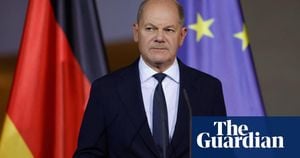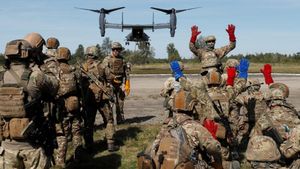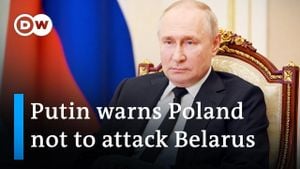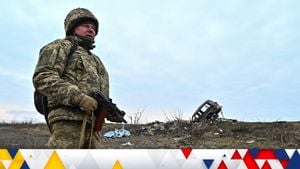The political scene of Romania is shifting with the recent parliamentary elections reflecting significant and turbulent change. The ruling leftist Social Democratic Party (PSD) not only managed to hold its ground but emerged with stronger support amid mounting gains by far-right parties vying for influence. This election, held on December 1, marks the second of three key ballots, coming closely on the heels of the first round of the presidential election held on November 24, where independent candidate Călin Georgescu, representing far-right sentiments, unexpectedly surged to the forefront.
With nearly all votes counted after the parliamentary elections, PSD secured about 22% of the votes, outpacing the nationalist Alliance for the Union of Romanians (AUR), which garnered approximately 18%. Meanwhile, the center-right National Liberal Party (PNL) and the center-left Save Romania Union (USR) brought additional layers to the political tableau, receiving about 14% and 12% respectively. Notably, far-right parties have increased their presence, indicating rising nationalist sentiments within Romanian society.
The results from Sunday’s election will pave the way for coalition-building efforts, as no single party secured the majority necessary to govern independently. According to Romania's electoral structure, 235 members are needed from the parliament’s total of 467 lawmakers to form a viable government, and the PSD remains short on this count. Discussions are underway for possible alliances, with PSD’s Vice President, Victor Negrescu, emphasizing the desire for pro-European collaboration. He stated, “We expect the democratic, pro-European parties to understand how the Social Democratic Party can be the balancing factor around which future majority can be formed.” These sentiments reflect hopes to maintain Romania’s European integration progress, positioning the PSD against the growing wave of far-right extremism.
Romania, as part of the broader European Union framework, finds itself at the crossroads of political ideologies amid increasing pressures from within and outside its borders. The entrance of far-right parties, many with overtly nationalist agendas, adds to the fragmented political narrative, which analysts argue is symptomatic of deepening social divisions and economic frustrations within the country. The sentiment among voters has shifted, reflecting disenchantment with traditional parties, marked by allegations of corruption and ineffective governance.
With the controversial results of the presidential election raising questions about potential interference, citizens are questioning the integrity of their electoral processes. Evidence has surfaced pointing to the possibility of external meddling, especially from hostile actors citing Romania’s historical ties with Ukraine, leaving many to speculate if the rise of far-right candidates, like Georgescu, is indicative of larger geopolitical influences at play.
Călin Georgescu’s candidacy has sparked concerns among pro-EU factions, hoping to sustain the nation’s traditionally supportive stance on European integration and NATO alliances. His unforeseen victory during the presidential primaries has prompted urgent discussions on how best to navigate Romania’s political future, with many fearing the rise of anti-EU sentiments could regress the progress made since the country joined the EU.
Romania's budget deficit, now the highest in the EU at 8% of the GDP, is also weighing heavily on voters' minds, alongside rising inflation rates. Many citizens are expressing dissatisfaction, with numerous voters stating the need for immediate change and innovative solutions to longstanding issues affecting their daily lives.
On the other hand, the Social Democrats are expected to strengthen collaborative efforts with centrist parties, positioning themselves as balanced and responsible leaders amid clamoring populist waves. “A coalition with centrist parties is more likely than with the hot potato extremists,” commented political analyst Radu Magdin, echoing sentiments on the complexity of potential coalition negotiations.
The outcome of the elections has set the stage for the urgent need to address economic concerns, social issues, and the growing discontent among citizens. Political commentators remark on the fact this could be seen as a warning to the political elite, compelling them to reassess their approaches to governance. Prime Minister Marcel Ciolacu, even amid victory, noted during his addresses the grave responsibilities accompanying the rise of extremist sentiments. He stated, “Romanians, at this point, have handed out a warning card to the entire political class.”
From regional perspectives, the parliamentary elections represent a significant moment to improve Romania's standing within the EU framework, ensuring stability and progression, amid global uncertainties. The mixture of traditional party support with resurgent far-right leanings reflects on the changes within Romanian society, prompting another round of introspection on the direction the country will take moving forward.
With the second round of the presidential elections slated for December 8, all eyes will remain on the outcome, which will also define who can propose the next Prime Minister. Should Georgescu continue his upward momentum, it could spell difficulties not just for traditional parties but also alter the geopolitical course of Romania’s future.
Citizens are caught between hope and uncertainty as they await developments post-elections, signifying Romania’s unique blend of democratic resilience going forward. Political alliances will undoubtedly be tested, just as the populace awaits clarity on governance, portraying the essence of democracy and the dynamic nature of political engagement.
Despite the looming possibility of unrest stemming from the fragmented electorate, the pro-European factions, represented by the PSD and its allies, are poised to rediscover their footing amid shifting political paradigms. The strategy forward lies within the bounds of unity, emphasizing shared values and future goals as the nation braces itself for the upcoming electoral events and uncertain future.



